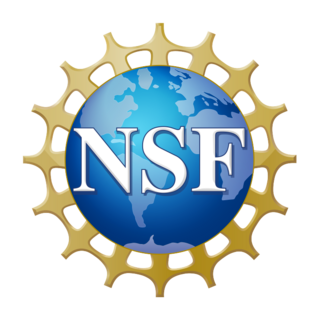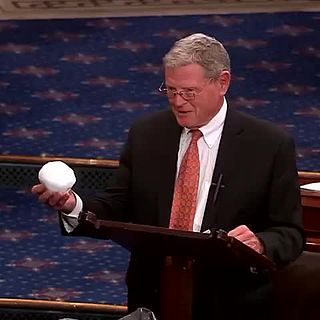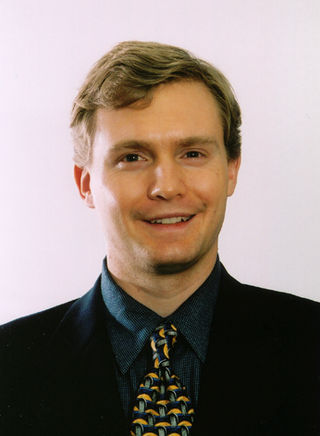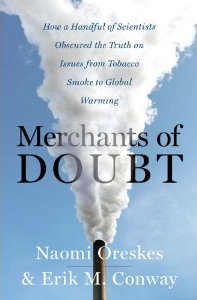Related Research Articles

The U.S. National Science Foundation (NSF) is an independent agency of the United States federal government that supports fundamental research and education in all the non-medical fields of science and engineering. Its medical counterpart is the National Institutes of Health. With an annual budget of about $9.9 billion, the NSF funds approximately 25% of all federally supported basic research conducted by the United States' colleges and universities. In some fields, such as mathematics, computer science, economics, and the social sciences, the NSF is the major source of federal backing.
Advocacy is an activity by an individual or group that aims to influence decisions within political, economic, and social institutions. Advocacy includes activities and publications to influence public policy, laws and budgets by using facts, their relationships, the media, and messaging to educate government officials and the public. Advocacy can include many activities that a person or organization undertakes, including media campaigns, public speaking, commissioning and publishing research. Lobbying is a form of advocacy where a direct approach is made to legislators on a specific issue or specific piece of legislation. Research has started to address how advocacy groups in the United States and Canada are using social media to facilitate civic engagement and collective action.

Science policy is concerned with the allocation of resources for the conduct of science towards the goal of best serving the public interest. Topics include the funding of science, the careers of scientists, and the translation of scientific discoveries into technological innovation to promote commercial product development, competitiveness, economic growth and economic development. Science policy focuses on knowledge production and role of knowledge networks, collaborations, and the complex distributions of expertise, equipment, and know-how. Understanding the processes and organizational context of generating novel and innovative science and engineering ideas is a core concern of science policy. Science policy topics include weapons development, health care and environmental monitoring.
The politicization of science for political gain occurs when government, business, or advocacy groups use legal or economic pressure to influence the findings of scientific research or the way it is disseminated, reported or interpreted. The politicization of science may also negatively affect academic and scientific freedom, and as a result it is considered taboo to mix politics with science. Historically, groups have conducted various campaigns to promote their interests in defiance of scientific consensus, and in an effort to manipulate public policy.
Policy is a deliberate system of guidelines to guide decisions and achieve rational outcomes. A policy is a statement of intent and is implemented as a procedure or protocol. Policies are generally adopted by a governance body within an organization. Policies can assist in both subjective and objective decision making. Policies used in subjective decision-making usually assist senior management with decisions that must be based on the relative merits of a number of factors, and as a result, are often hard to test objectively, e.g. work–life balance policy. Moreover, governments and other institutions have policies in the form of laws, regulations, procedures, administrative actions, incentives and voluntary practices. Frequently, resource allocations mirror policy decisions.
The Union of Concerned Scientists (UCS) is a nonprofit science advocacy organization based in the United States. The UCS membership includes many private citizens in addition to professional scientists. Anne Kapuscinski, Professor of Environmental Studies and Director of the Coastal Science and Policy Program at the University of California, Santa Cruz, currently chairs the UCS Board of Directors, having replaced James J. McCarthy, Professor of Biological Oceanography at Harvard University and past president of the American Association for the Advancement of Science in 2015.

The politics of climate change results from different perspectives on how to respond to climate change. Global warming is driven largely by the emissions of greenhouse gases due to human economic activity, especially the burning of fossil fuels, certain industries like cement and steel production, and land use for agriculture and forestry. Since the Industrial Revolution, fossil fuels have provided the main source of energy for economic and technological development. The centrality of fossil fuels and other carbon-intensive industries has resulted in much resistance to climate friendly policy, despite widespread scientific consensus that such policy is necessary.
Evidence-based policy is a concept in public policy that advocates for policy decisions to be grounded on, or influenced by, rigorously established objective evidence. This concept presents a stark contrast to policymaking predicated on ideology, 'common sense', anecdotes, or personal intuitions. The methodology employed in evidence-based policy often includes comprehensive research methods such as randomized controlled trials (RCT). Good data, analytical skills, and political support to the use of scientific information are typically seen as the crucial elements of an evidence-based approach.
The American Institute of Biological Sciences (AIBS) is a nonprofit scientific public charitable organization. The organization's mission is to promote the use of science to inform decision-making and advance biology for the benefit of science and society.

The Republican War on Science is a 2005 book by Chris Mooney, an American journalist who focuses on the politics of science policy. In the book, Mooney discusses the Republican Party leadership's stance on science, and in particular that of the George W. Bush administration, with regard to issues such as climate change denialism, intelligent design, bioethics, alternative medicine, pollution, separation of church and state, and the government funding of education, research, and environmental protection. The book argues that the administration regularly distorted and/or suppressed scientific research to further its own political aims.

The Infectious Diseases Society of America (IDSA) is a medical association representing physicians, scientists, and other healthcare professionals who specialize in infectious diseases. It was founded in 1963 and is based in Arlington, Virginia. As of 2018, IDSA had more than 11,000 members from across the United States and nearly 100 other countries on six different continents. IDSA's purpose is to improve the health of individuals, communities, and society by promoting excellence in patient care, education, research, public health, and prevention relating to infectious diseases. It is a 501(c)(6) organization.

In the psychology of human behavior, denialism is a person's choice to deny reality as a way to avoid believing in a psychologically uncomfortable truth. Denialism is an essentially irrational action that withholds the validation of a historical experience or event when a person refuses to accept an empirically verifiable reality.
Public engagement or public participation is a term that has recently been used to describe "the practice of involving members of the public in the agenda-setting, decision-making, and policy-forming activities of organizations/institutions responsible for policy development." It is focused on the participatory actions of the public to aid in policy making based in their values.

Climate change denial is a form of science denial characterized by rejecting, refusing to acknowledge, disputing, or fighting the scientific consensus on climate change. Those promoting denial commonly use rhetorical tactics to give the appearance of a scientific controversy where there is none. Climate change denial includes unreasonable doubts about the extent to which climate change is caused by humans, its effects on nature and human society, and the potential of adaptation to global warming by human actions. To a lesser extent, climate change denial can also be implicit when people accept the science but fail to reconcile it with their belief or action. Several studies have analyzed these positions as forms of denialism, pseudoscience, or propaganda.

William Raymond Steiger is a Public Policy Fellow at the Wilson Center in Washington, D.C.. He served as Chief of Staff at the United States Agency for international Development from 2017 to 2021. Previously, Steiger was the chief program officer at Pink Ribbon Red Ribbon, an organization affiliated with the George W. Bush Institute, which works to reduce deaths from cervical cancer and breast cancer in low- and middle-income countries. He was the Special Assistant to the Secretary for International Affairs and the Director of the Office of Global Health Affairs at the U.S. Department of Health and Human Services (DHHS) during the George W. Bush administration, with a portfolio that included HIV/AIDS, malaria, avian flu and pandemic-influenza preparedness.
Politics is the process by which groups of people make decisions. Although the term is generally applied to behavior within civil governments, politics is observed in all human group interactions, including corporate, academic, and religious institutions. Politics consists of "social relations involving authority or power. The definition of "politics" from "The Free Dictionary" is the study of political behavior and examines the acquisition and application of power. Politics study include political philosophy, which seeks a rationale for politics and an ethic of public behavior, and public administration, which examines the practices of governance.

Merchants of Doubt: How a Handful of Scientists Obscured the Truth on Issues from Tobacco Smoke to Global Warming is a 2010 non-fiction book by American historians of science Naomi Oreskes and Erik M. Conway. It identifies parallels between the global warming controversy and earlier controversies over tobacco smoking, acid rain, DDT, and the hole in the ozone layer. Oreskes and Conway write that in each case "keeping the controversy alive" by spreading doubt and confusion after a scientific consensus had been reached was the basic strategy of those opposing action. In particular, they show that Fred Seitz, Fred Singer, and a few other contrarian scientists joined forces with conservative think tanks and private corporations to challenge the scientific consensus on many contemporary issues.
The Journal of Global Drug Policy and Practice describes itself as an open access peer-reviewed public health journal. Critics say it is biased, not peer-reviewed, and not a legitimate scientific journal. It is funded by the US Department of Justice.
Policy advocacy is defined as active, covert, or inadvertent support of a particular policy or class of policies. Advocacy can include a variety of activities including, lobbying, litigation, public education, and forming relationships with parties of interest. Advocating for policy can take place from a local level to a state or federal government. For example, a local advocacy group in Brunswick, Georgia, Defenders of Wildlife, advocated for the passage of the H.R. 5552 Migratory Bird Protection Act during 2020 when rollbacks to the bill were introduced from the Trump Administration. At the state level, advocacy for policy can be a joint effort between advocacy groups. In the United States, advocacy groups around the nation planned joint efforts to get the Uniform Partition of Heirs Property Act (UPHPA) signed into law in each of their respective states and in 2018, the bill was signed into law by Texas Governor Greg Abbott making it the tenth state to enforce this law.
Politicisation is a concept in political science and theory used to explain how ideas, entities or collections of facts are given a political tone or character, and are consequently assigned to the ideas and strategies of a particular group or party, thus becoming the subject of contestation. Politicisation has been described as compromising objectivity, and is linked with political polarisation. Conversely, it can have a democratising effect and enhance political choice, and has been shown to improve the responsiveness of supranational institutions such as the European Union. The politicisation of a group is more likely to occur when justifications for political violence are considered acceptable within a society, or in the absence of norms condemning violence.
References
- ↑ Science 2006, Seed Magazine, October 6, 2006
- ↑ SEA Action Fund, March 4, 2008
- ↑ Bill of Rights for Scientists and Engineers Archived 2008-02-09 at archive.today , SEA Website, February 19, 2008
- ↑ SEA Mission Statement Archived 2008-02-09 at archive.today , SEA Website, February 19, 2008
- ↑ Innovation & the Elections 2008 Archived 2008-06-26 at the Wayback Machine , 18 June 2008.
- ↑ "Board of Advisors". Scientists and Engineers for American. Archived from the original on 2008-02-09. Retrieved March 4, 2008.
- ↑ "The Colbert Report - Peter Agre" (video). colbertnation.com. 19 October 2009.
- ↑ Under the Microscope, The Wall Street Journal, October 6, 2006
- ↑ Look who's talking, SEA Website, January 16, 2007